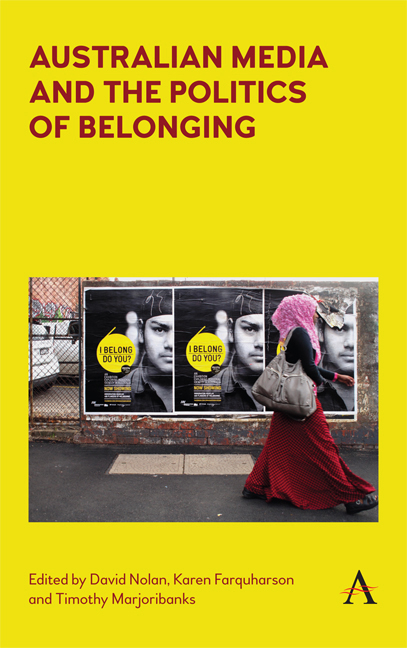Book contents
- Frontmatter
- Contents
- List of Illustrations
- Acknowledgements
- Part I THEORIZING BELONGING IN CONTEMPORARY AUSTRALIA
- Part II SUDANESE AUSTRALIANS, MEDIA PRACTICES AND THE POLITICS OF BELONGING
- Chapter 4 Talking about the Other: Sudanese Australians and the Language of Difference on Talkback Radio
- Chapter 5 In a Context of Crime: Sudanese and South Sudanese Australians in the Media
- Chapter 6 Journalism Practice, the Police and Sudanese Australians
- Chapter 7 Constructing the Heroic Other and ‘They Always Asked about Africa, They Never Asked about Me’: Three Screen Representations of Sudanese Australians
- Part III SHIFTING THE POLITICS OF BELONGING: MEDIA INTERVENTIONS AND POSSIBILITIES FOR TRANSFORMATION
- Notes on Contributors
- Index
Chapter 4 - Talking about the Other: Sudanese Australians and the Language of Difference on Talkback Radio
from Part II - SUDANESE AUSTRALIANS, MEDIA PRACTICES AND THE POLITICS OF BELONGING
Published online by Cambridge University Press: 21 June 2018
- Frontmatter
- Contents
- List of Illustrations
- Acknowledgements
- Part I THEORIZING BELONGING IN CONTEMPORARY AUSTRALIA
- Part II SUDANESE AUSTRALIANS, MEDIA PRACTICES AND THE POLITICS OF BELONGING
- Chapter 4 Talking about the Other: Sudanese Australians and the Language of Difference on Talkback Radio
- Chapter 5 In a Context of Crime: Sudanese and South Sudanese Australians in the Media
- Chapter 6 Journalism Practice, the Police and Sudanese Australians
- Chapter 7 Constructing the Heroic Other and ‘They Always Asked about Africa, They Never Asked about Me’: Three Screen Representations of Sudanese Australians
- Part III SHIFTING THE POLITICS OF BELONGING: MEDIA INTERVENTIONS AND POSSIBILITIES FOR TRANSFORMATION
- Notes on Contributors
- Index
Summary
Introduction
Dominant categories of speech and of thought define the economically successful and the politically powerful as meritorious, and the unsuccessful and politically deviant as mentally or morally inadequate. For the same reason, policies that serve the interests of the influential come to be categorised as routine and equitable outcomes of duly established governmental processes. (Edelman 2013, 39)
Language is a fundamental communication modality through which we make sense of our world, defining who we are, who we are not, whilst explaining why these differences exist. This chapter draws on a body of critical discursive analytic work (Hanson- Easey and Augoustinos, 2010, 2012; Hanson- Easey, Augoustinos and Moloney, 2014) examining how language, or ‘discourse’, socially constructs cultural identities and differences between Anglo- Celtic and other non- indigenous Australians, and Sudanese Australians who have been represented as ‘Others’. I hope to illustrate how speakers manage the complex rhetorical issues implicated in formulating complaints against ‘visibly different’ (Colic-Peisker and Tilbury, 2007) humanitarian refugees – these interactional issues are closely wrapped up with the ideological business of differentiating social groups along cultural and racialized lines. The study of ideology in talk, and at the broader analytic level, collective discourse(Fairclough, 2001; Foucault, 1980), is used here to interrogate how language structures and rationalizes social hierarchies and justifies controversial refugee policies, rendering them fair, reasonable and even essentialto protecting the social status quo.
The tranche of research that informs this chapter on the language of othering employs a social constructionist epistemology (Burr, 2015) and, more specifically, the analytic framework of discourse analysis (Jørgensen and Phillips, 2002; Wetherell, 1998). Very generally, social constructionism holds that social identities, entities or events cannot be made meaningful without first being represented though communication and social interaction (Burr, 2015; Parker, 1998). Human beings are understood to interpret events and entities by drawing on discourses – particular ways of talking about and understanding the world. Discourses are closely related to the political and social conditions in which they operate and are embedded. At the core of social constructionism is the idea that discourse is constitutive: it constructs realities and is constitutive of social life – it builds (represents) what we know about things, processes, social identities and relations (Wetherell, 2001).
- Type
- Chapter
- Information
- Australian media and the politics of belonging , pp. 63 - 84Publisher: Anthem PressPrint publication year: 2018



